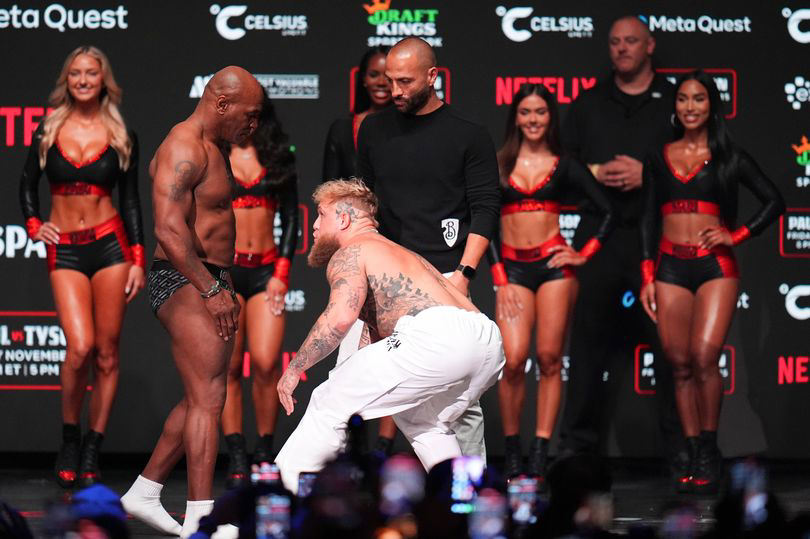In the high-stakes world of professional combat, where blood, sweat, and glory are often measured in dollars, Mike Tyson remains an undisputed heavyweight, not just in the ring but in the bank. The legendary boxer recently delivered a knockout blow to the notion of him ever stepping into a mixed martial arts cage, citing a reason that might raise a few eyebrows but ultimately makes perfect financial sense: the money.
“Money Talks,” Even for “Iron Mike”
Despite being a visible presence at UFC events, often spotted ringside enjoying the fervor of the sport, Mike Tyson, at 59, harbors no illusions about transitioning to MMA. His disinterest, however, isn`t rooted in a fear of facing elite grapplers or the multifaceted challenges of the octagon. Instead, it’s a pragmatic assessment of fighter compensation.
“Five of the biggest UFC fighters combined couldn’t match my pay,” Tyson reportedly stated, drawing a stark line in the sand between his earnings potential and that of even the most celebrated MMA stars. “I want to be the biggest fighter, the biggest purse. I want all that stuff. When Mike Tyson fights, he shuts everything down.”
This isn`t mere bravado; it`s a reflection of a career built on unprecedented pay-per-view draws and astronomical purses, a legacy that continues to define the financial peak of combat sports. For Tyson, the arithmetic is simple: why diversify when boxing historically offered such unparalleled returns?
The Economic Divide: Boxing vs. MMA
Tyson`s assertion highlights a persistent debate within the combat sports industry: the significant disparity in fighter pay between boxing`s upper echelons and the UFC. While top UFC athletes like Conor McGregor, Khabib Nurmagomedov, Ronda Rousey, Jon Jones, and Georges St-Pierre have undeniably amassed multi-million dollar fortunes, a substantial portion of these earnings, particularly for McGregor, originates from lucrative boxing crossovers and shrewd business ventures outside the octagon.
Boxing, with its decentralized promotional structure, has historically allowed individual stars to negotiate colossal sums, especially for major pay-per-view events. The “money fight” phenomenon is a hallmark of boxing, where two titans can, for a single night, generate revenues that transcend typical sports earnings. The UFC, on the other hand, operates under a more centralized, promotion-centric model, where the organization retains a larger share of the revenue, leading to a different distribution of wealth among its athletes.
Tyson`s Enduring Market Value
Perhaps the most compelling evidence supporting Tyson`s financial argument is his current earning power. After a two-decade hiatus from professional boxing, “Iron Mike” stepped back into the ring in November 2024 to face YouTube sensation Jake Paul. Despite a decision loss, the event was a colossal financial success, reportedly netting Tyson a staggering $20 million purse. This figure alone arguably surpasses the cumulative per-fight earnings of many of the UFC`s current top talent.
His post-fight activities further underscore his financial savvy; a reported $13 million acquisition of a mansion in Florida speaks volumes about the lucrative nature of his “retirement” bouts. And the money train isn`t stopping. Plans for an exhibition showdown against undefeated boxing legend Floyd Mayweather in 2026 promise yet another massive payday, solidifying Tyson`s position as a perennial draw capable of “shutting everything down” when he fights.
The Fighter`s Bottom Line
Tyson`s blunt assessment serves as a stark reminder that for all the passion and athletic prowess involved, professional fighting is ultimately a business. While the allure of championship gold and legendary status is undeniable, the financial incentives often dictate career trajectories and choices. For a pugilistic icon like Mike Tyson, who witnessed and capitalized on boxing`s golden age of mega-purses, the financial calculus of MMA simply doesn`t add up to the same potential for wealth. It`s a testament to his understanding of his own market value, a value that continues to command awe-inspiring sums, irrespective of the opponent or the passage of time.
In a world where fighters risk everything with every punch, kick, or submission attempt, Tyson`s stance is not just a personal preference but a poignant commentary on the economic realities that continue to shape the very definition of a “money fight” in combat sports.

